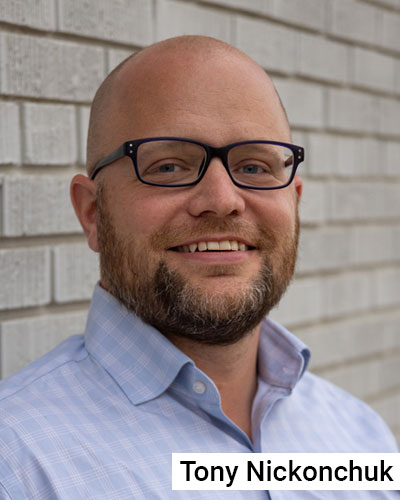
Many pharmacists are dedicated to giving back to their profession by precepting students as part of their university degree or college diploma program, and provisional registrants taking part in ACP’s Structured Practical Training (SPT) program. Some pharmacists are recognized for being outstanding preceptors. We spoke with three of these pharmacists about the methods they use to ensure preceptees get the most out of their experience.
Craig MacAlpine
Licensee, Walmart Pharmacy, Leduc
 Why did you become a preceptor?
Why did you become a preceptor?
“Initially, for me, it was about giving back to the profession. Very early after graduating, I realized how important my preceptors were to me when I was a student. I wanted to make sure students have the same quality of preceptor I had. Precepting students keeps me up on the latest medications and recommendations. It’s a win-win. Students will do well if they have a good preceptor and preceptors learn along with them.”
What were some traits of the preceptors you had that you have applied when precepting?
“Patience. Students graduating these days are heads and tails above those of us who graduated 10-plus years ago. However, being patient, listening to the student, trying to understand areas they need to improve and what they’re doing well. I like to make sure to set students up for success while they’re here, which will help them be successful as they move along and become a pharmacist.”
What do you do to make sure your preceptees succeed?
“We focus on the process. Everything we do should have a process. I’ve set up a clinical process to allow for students to participate in follow-ups and care plans, depending on what year they are in. Once they get to know the system here, the process will allow them to be confident and provide as much care to the patients as they can on a daily basis.”
What is your evaluation approach?
“When students come to me and ask me what I would do in a certain situation, I will often turn the question around and ask them what they would do. I don’t like to give them all the information right off the bat. I encourage them to critically think and try to get there without me spelling it out for them. That’s part of the overall assessment. At the start of the rotation, they may need a bit more guidance from me, but by the end, they should be more self-sufficient to be able to find the information they need on their own.”
How do you give feedback to preceptees?
“Feedback can and should be delivered differently, depending on the student you have. Some students like verbal feedback, while others prefer written feedback so they can read it over to really understand it. I like to provide my thoughts on what they’re doing well and what they need to improve on. That approach helps motivate the students.”
Sheri Koshman
Associate Professor of Medicine, Division of Cardiology, University of Alberta
Coordinator, Advanced (Year 2) Pharmacy Residency – Cardiology, Pharmacy Services, Alberta Health Services
Pharmacist, Heart Function Clinic and Cardio-Oncology Clinic, Mazankowski Heart Institute
 Why did you become a preceptor?
Why did you become a preceptor?
“I got the opportunity to learn under many great preceptors, so I want to pay it forward. I have a specific set of skills that I can share to advance practice. Some of what I do is a bit outside the box when it comes to typical pharmacy practice, so I feel like it’s an added value for students who want to progress or have an advanced practice. Because my practice setting is not typical, it’s a good opportunity for students to see a different setting and be aware of what’s possible in pharmacy practice.”
How do you open students’ eyes to opportunities?
“Much of what students learn in university seems black and white because it’s difficult for them to put their learning into context with a person in front of them. Precepting is about helping them apply what they’ve learned, develop skills to manage patients, and consider individual factors that may change their decisions and approach to care. If students don’t have opportunities to see multiple patients, repeat, and perform their skills, they don’t grow as clinicians. My job as a preceptor is to provide them with authentic patient experiences so that they can practise, and we can talk about it. They need to build their clinical acumen to have a feel for how they would manage different scenarios and develop competency and confidence.”
How do you ensure that your students have a good experience?
“They need to come with learning objectives, but if they’ve never been in this type of practice, they may not know what to expect. Sometimes I can’t meet their initial objectives, so typically a week in, we’ll debrief and perhaps redesign what they want to get out of the rotation. The reality is most of the students I work with won’t end up working in cardiology, so what we’re really working on is how they assess a patient, how they look for information, and then how they put it all together to provide good care. These skills are transferable to whatever practice they go to.”
How do you support a student who is struggling?
“It’s important to have a conversation with them early to help understand why they’re having a difficult time meeting expectations. Sometimes they may not know what deficiencies they have because no one has ever told them. I am truthful about what I’ve seen, and where I would expect them to be based on where they are in their training, and how they might improve using tangible examples. Often, they will say, ‘Thanks, no one’s ever told me this.’ It’s a hard conversation to have, but you owe it to them to help them improve and develop as a practitioner. You’re doing that student a disservice by just passing them to the next level because you don’t want to deal with them. Remember, that student will eventually be your colleague.”
How do you evaluate preceptees?
“I typically have the student do their self-assessment first. It gives them an opportunity to be insightful and communicate their perceptions. Nine times out of 10, they know if they’re doing a good job or having a hard time. Often, they’ll be more critical of themselves than you will be as a preceptor. That provides an opportunity for a discussion. It’s very important to give your rationale as to whether you agree or disagree with their self-assessment. If you think they’re doing a good job or a bad job, give them examples to help explain why.”
Tony Nickonchuk
Drug Utilization and Stewardship Pharmacist, Alberta Health Services, Peace River
 Why did you first decide to become a preceptor?
Why did you first decide to become a preceptor?
“I didn’t have the greatest hospital rotation when I was a student, so I wanted to make it valuable for students who get hospital rotations, especially in rural settings. I wanted them to see what a pharmacist can do in a hospital setting and how much value we bring to the team. I wanted to give them a good experience and open their eyes about the possibilities they have in pharmacy.”
What do you do to ensure they have a valuable experience?
“I establish very early on that I’m not there to test them, trip them up, or trick them. I had some of those experiences when I was in rotation and it’s not positive. I tell them right away that this is their time to ask questions, to learn, and to identify what they need to work on. I tried to make it comfortable and safe and not scary, because I remember being terrified for my hospital rotation. I tried to be with them whenever I can, but it is valuable for them to be independent. When I felt they were ready, I’d let them see patients independently and then discuss the cases with me.”
How are you a mentor for the students?
“When I was a student and a hospital pharmacist would come talk to us in one of our classes, I always felt that they were in a different league. I felt intimidated by them. I didn’t think I could ever be a hospital pharmacist. I tried to bring some comfort to the role and show them it’s a career path they can take; it’s not for a select, elite group of individuals. If you’re interested, you can go for it. I showed them the practice model that I set up, what it entails, and to explore for themselves. I just tried to set an example that they can emulate in the future.”
How do you give feedback to students?
“By the time we get to the final evaluation, nothing we talk about should be a surprise. We should have talked about all of it as we went along. I had one student who really struggled with making phone calls. I understood where that discomfort came from, but the reality was he was going to have to talk on the phone a lot as a pharmacist, so he was going to have to develop some comfort with that. We talked about how he could challenge himself and I pushed him to make phone calls and get more experience with it. That wasn’t something I waited to tell him in the final review.”
What would you say to other pharmacists who haven’t precepted before?
“Try it at least once. To me, it’s an incredibly valuable experience. It does increase your workload—I was busier when students were around—but it’s a good busy. If you plan and set out expectations with the students from the get-go, it will work out. When they leave, you’ll find yourself wishing they were back. The work is really rewarding. I often developed positive relationships with my students and we became friends. Now they’re practising and are my colleagues. Precepting can be difficult at times, but the positives outweigh any challenges.”




